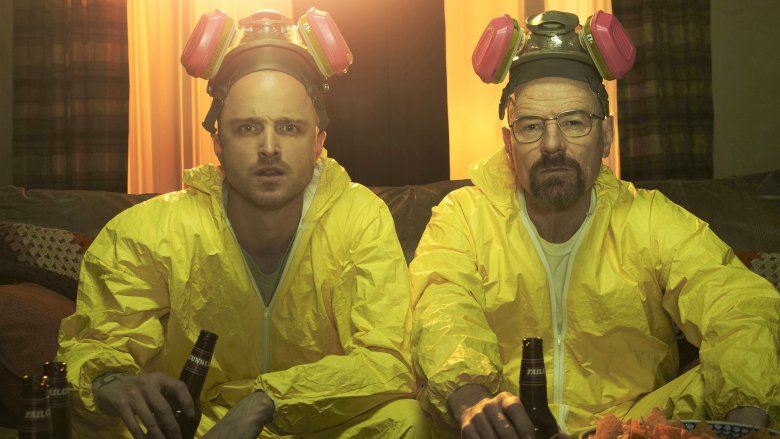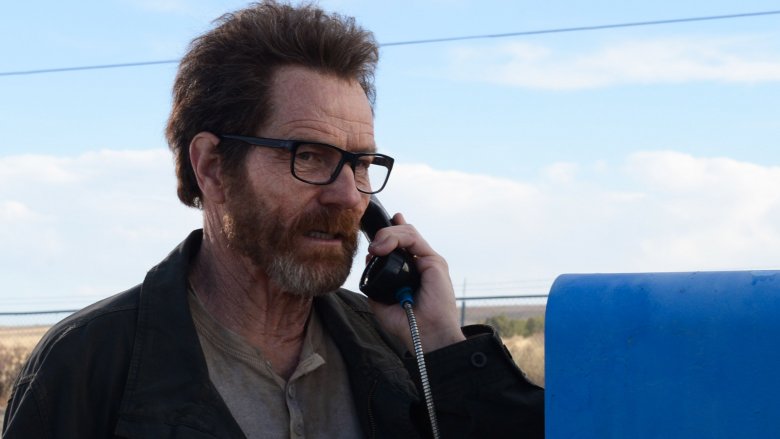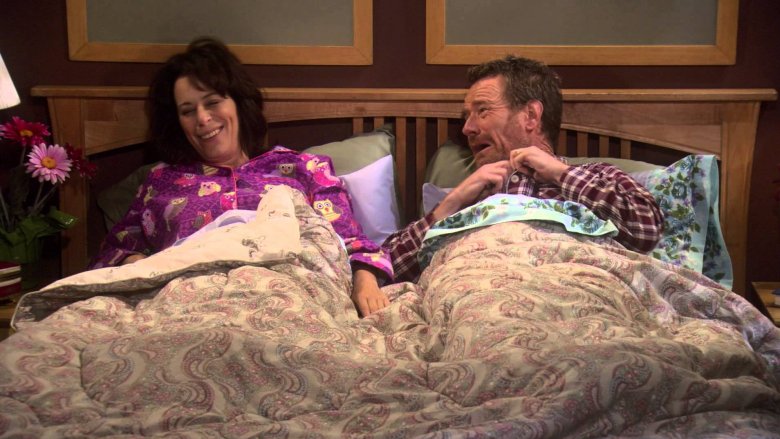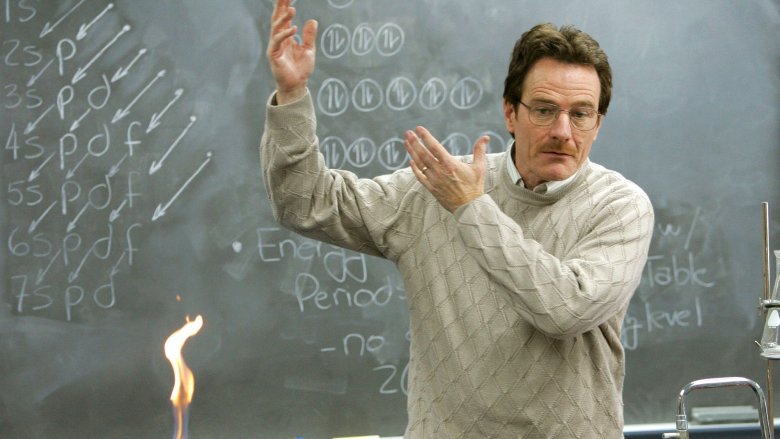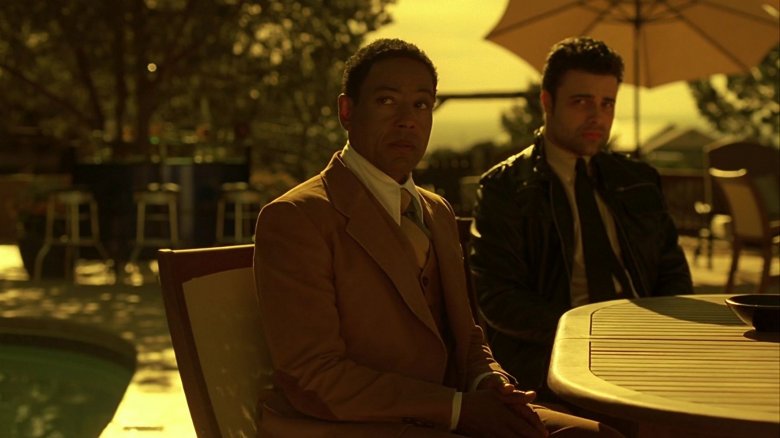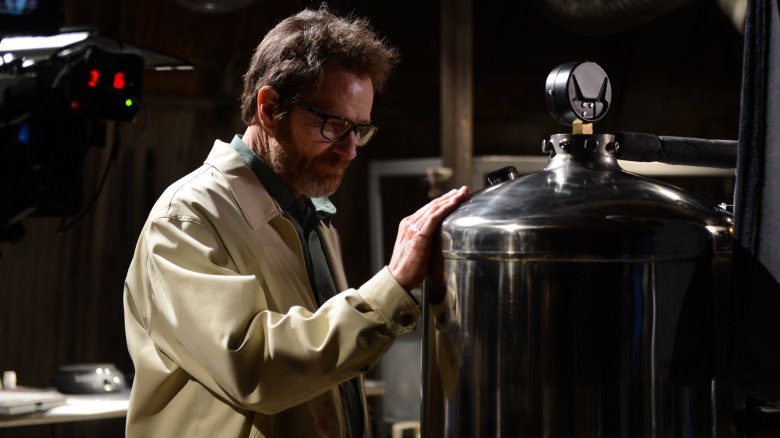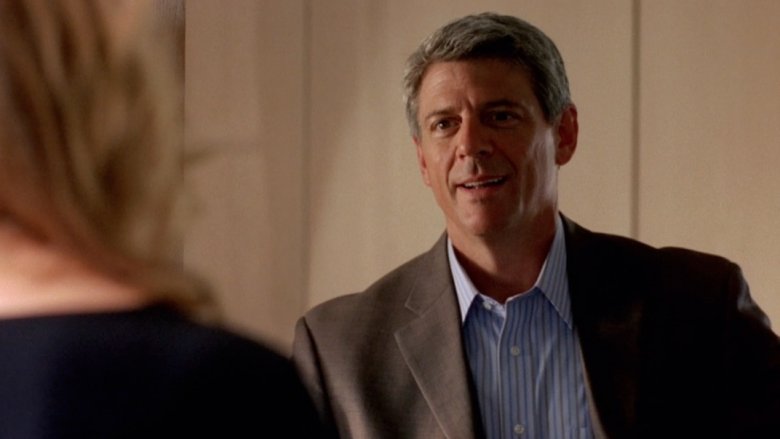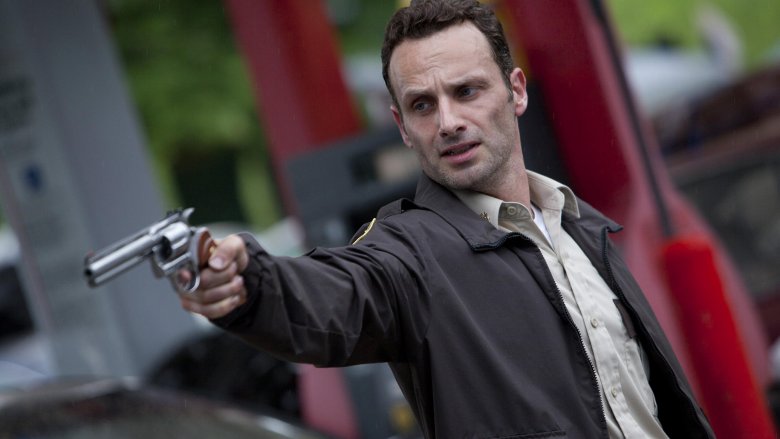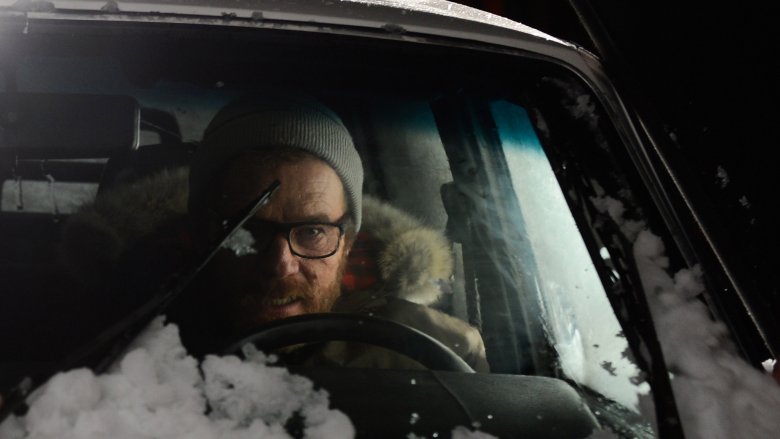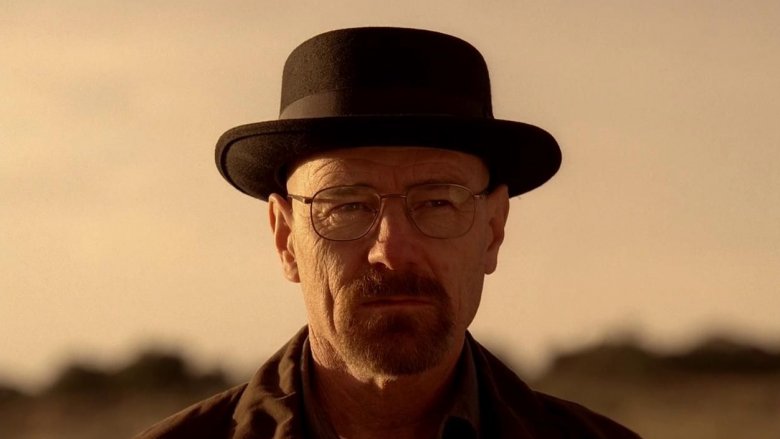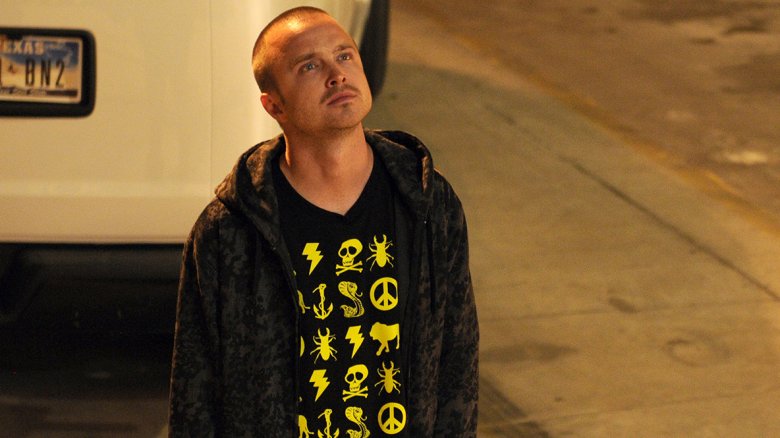Bold Breaking Bad Fan Theories
Breaking Bad stands as one of the most critically-acclaimed television shows ever made, and it's easy to see why. From the powerful performances to the beautiful cinematography, every aspect of the show seemed guaranteed to impress. Still, Breaking Bad's not-so-secret weapon was always the writing staff that was able to plot out twists and turns that made perfect sense, while also leaving plenty of room for interpretation. Even though the show has ended, that hasn't stopped die-hard fans and new converts from finding the series and building their own thoughts and fan theories on top of the released work.
And some of those fan theories are pretty out there ... while some of them actually make a little bit of sense. With that in mind, let's take a look at some of the boldest Breaking Bad fan theories. From absolutely ludicrous time-travel takes to solid, well-constructed arguments, there are elements for everyone here. Here's your mandatory spoiler warning before we get cooking.
Walt takes habits from those he kills
Whether you believe that Walter White was just a good man who broke bad or a monster playing house until he had the chance to be as evil as he always wanted, it's undeniable that Walt racks up a sizable body count over the course of Breaking Bad. Sure, most of those deaths can be explained away morally. For example, Krazy-8 was killed in self-defense, Walt felt he had to kill Gus to survive, etc. However, one fan theory positions Walt as creepy a serial killer as Hannibal Lecter or Dexter. The theory instantly turns Walt into a much more malevolent force within the show, and there's actually a fair bit of evidence to support it.
Supposedly, Walt takes certain habits from those he kills. After killing Krazy-8, who likes to have the crust cut off of his sandwiches, Walt adopts the same habit. Gus Fring, when throwing up in the toilet, would place a towel on the floor, and Walt does the same thing after he kills him. Before murdering Mike, Walt orders his whiskey neat. Afterwards, he orders it on the rocks, just like Mike does.
A driving force behind this fan theory is that Walt uses Skyler's maiden name while on the run in the flash-forward scene in the beginning of season five. Some fans believed that moment hinted that Walt would kill Skyler ... which obviously didn't happen. Still, even though the theory petered out by the end of the show, it's hard not to rewatch the series and pick up on specific moments where Walt's mimicry of his victims feels sinister.
The Malcolm in the Middle fan theory
Ending a show with a reveal that it was all a dream has been a cliche ever since St. Elsewhere actually did it in 1988. Ever since then, you can't even talk about fan theories without at least acknowledging the possibility that the entire show was a dream. Add in the fact that fans love connecting an actor's disparate projects into a unified whole, and it probably won't surprise you that fans have been arguing that Breaking Bad is either a prequel, sequel, or dream sequence to Bryan Cranston's previous television show, Malcolm in the Middle. What makes this fan theory especially bold, though, is that it caught on so heavily within the fan community that it was actually made canon ... in a sense.
In an alternate ending to the Breaking Bad series included in the complete box set (pictured above), Hal (Cranston) wakes up from a nightmare and begins telling Lois (Jane Kaczmarek) all about his life as Walter White. But was it all a dream? Maybe Walt hopped into another reality or was reincarnated as Hal. Or maybe, just maybe, people on the internet have way too much time on their hands.
The events of Breaking Bad are just a fantasy that Walt's students made up
It's common practice in fan theories to find ways to impose dark or creepy readings to ostensibly wholesome stories. These are fan theories like the ones that argue that Ed, Edd n Eddy takes place in purgatory, or that Creed from The Office is the Scranton Strangler. However, there's also an oppositional style of fan theory that turns extremely dark stories into more wholesome entertainment, like imagining that Game of Thrones is just a really intense Dungeons and Dragons game.
In the case of Breaking Bad, one compelling fan theory imagines that the events of the show are just a fantasy that Mr. White's bored chemistry students, all made up to explain Walt's continuing absences. Instead of Mr. White really transforming into a vicious crime boss, the story of Breaking Bad is just a game of make-believe that gets more and more wild. Gus Fring is just a local restaurant owner that the kids add to the story to make it more exciting, while Jesse is an older student that some of the kids remember. Maybe Mr. White would be flattered by all this attention.
Gus Fring's business partner was also his romantic partner
Played by Giancarlo Esposito, Gus Fring is one of the most electrifying characters on Breaking Bad. Mild-mannered in public and absolutely ruthless in private, he has very few moments of genuine honesty with the other characters, which only serves to make him more mysterious. He tells Walt during a dinner that he has a family, but they're never seen on-screen and never mentioned after his death, which seems to imply that Gus was lying to manipulate Walt. The only genuine connection he seems to have is with his business partner, Max, who's briefly seen and immediately killed in a flashback. Max's death is so traumatic for Gus that he spends years carefully plotting his vengeance on Don Eladio and the Salamancas.
Considering that his business partner's death seems to be the driving motivation for everything that Gus does, some fans have inferred that Max was a partner to Gus in more ways than one. After all, lost love is a pretty good motivator to go to war with a cartel. And honestly, the thought of dealing with a heartbroken Gus Fring is probably the scariest idea imaginable.
Walt survives the final episode of Breaking Bad
Walter White ends Breaking Bad in the abstract arms of his true love: the chemistry equipment that he used to cook meth. He dies of a stray bullet after killing the neo-Nazis that kidnapped Jesse and killed Hank Schrader. Even though Walt dies at the end, it seems like he accomplished everything that he wanted to. But did he really die? Plenty of viewers believed that he survived the stray bullet and was arrested by the police after the credits rolled. One notable partisan for this take is James Hamblin, who wrote an article for The Atlantic, alleging that Walt is 100 percent alive after the events of Breaking Bad. Sure, Bryan Cranston himself has said that Walt dies at the end of the show, and even the actual script of the final episode seems to imply that Walt goes off to meet his maker in the closing minutes. But the idea that Walt is still out there, plotting a comeback, is a whole lot of fun to think about.
Walt Jr. is Ted Beneke's son
Unlike nearly every other character on the show, Walt Jr. starts off as a good kid trying his best and ends the show as a good kid trying his best. He doesn't really have the moral rot that so many other characters end up with, and his biggest concerns are keeping his family together and learning how to drive. However, one fan theory alleges that Walt Jr. didn't have any dark secrets of his own because his very existence is a dark secret.
When Skyler White goes back to work at Beneke Fabricators, there's an implication that something unprofessional happened between her and her boss, Ted Beneke. It seems that he made a drunken pass at her years before, which led to her leaving the company, but there might be more to it than just that. According to the fan theory, a scene in which Skyler impersonates Marilyn Monroe singing a sultry happy birthday song to Ted implies that their relationship had flirtations on both sides, which eventually led to Skyler getting pregnant from Ted.
From there, she likely passed the baby off as Walt's, since if Walt knew, you'd expect it to come up in five seasons' worth of story. The other evidence supporting this theory is that Ted compliments Walt Jr.'s looks by saying that the boy has "good genes" after Skyler shows him a picture. That could be a flirty compliment for Skyler, or it could be Ted acknowledging that he might be the father. While there's nothing in the show to fully discredit the fan theory, we feel that poor Walt Jr.'s been through enough without also having a secret dad.
The meth in Breaking Bad causes The Walking Dead
Fans love a crossover. Whether it's official crossovers like The Avengers or just connecting different properties, you don't have to look far to find a fan theory linking one property with another. In the case of Breaking Bad, fans picked up on an in-joke between the show and another AMC television show, The Walking Dead, and ran wild with it.
In the zombie future of The Walking Dead, Merle (Michael Rooker) has a secret drug stash which includes the blue meth that Walt and Jesse cook in Breaking Bad. In addition, Darryl (Norman Reedus) references a drug dealer that sounds a lot like Jesse. Fans took what clearly started as a fun nod to another AMC show and argued that the blue meth actually caused the zombie apocalypse seen in The Walking Dead. Supposedly, Gus' ability to walk away from an explosion with half of his face missing is due to his secret consumption of the blue meth, which has begun mutating people into zombies. From there, Walt's supply of zombification-causing meth spreads across the nation and, ultimately, the world. The theory doesn't really work on that level, but hey, maybe you'd prefer to believe that Walt gets up at the end of Breaking Bad and starts eating people. Anything is possible if you believe.
The Felina fan theory
The final episode of Breaking Bad, "Felina," seems to give Walt exactly what he wants in just about every way. He succeeds against all of his enemies, forces his old business partners to launder money for his family, and he even dies before the police arrive to arrest him. It's a real victory lap for everyone's favorite chemistry nerd. However, some fans believe that the entire episode seems so fantastical because it actually is a fantasy. According to some, the ending is just Walt hallucinating his revenge as he freezes to death in New Hampshire.
The fan theory likely exists to justify the feeling of frustration that many viewers felt watching Walt, undeniably a monstrous human being at this point in the show, basically get everything he wanted. It's a more satisfying ending — if you really hate Walt — for him to freeze to death without getting closure on anything, with his luck having finally run out. Except, that that's also the biggest problem with this fan theory. Walt is extraordinarily lucky. The string of good fortune and coincidences that allow him to survive until the final minutes of the episode is consistent with all the other times that Walt's lucked out of punishment. There's no real reason to think that his luck stops just short of the end of the show.
Characters' clothes hint at their inner lives
Clothes make the character. That's half the reason that costume designers have jobs in Hollywood. How characters dress and present themselves to the world shows off an important part of their psyche. Does it match with the other characters' clothing? Is the outfit loud and proud, or does it blend in with the background? There are plenty of ways to look at the clothes in Breaking Bad, but writer Luke Villapaz has a detailed rundown on what he believes the clothes and colors mean.
There's the obvious color theory in place, with uses of white representing purity and black representing darkness and deception, but as Villapaz points out, orange usually signifies death. That seems to be a direct reference to one of the most famous films of all time, The Godfather, which uses oranges as foreshadowing for a character's death. The whole time we thought we were watching Mr. Chips turn into Scarface, and instead, we ended up watching a show indebted to an entirely different gangster movie.
Mike is Jesse from the future trying to save himself
Some fan theories are so truly bonkers that you can't help but respect the boldness. We're talking about fan theories like the Ronbledore theory for Harry Potter, which imagines that Dumbledore is an aged, time-traveled version of Ron Weasley from the future. And because we live in a fundamentally good world that wants us to be happy, there exists a fan theory that argues that Mike Ehrmantraut is Jesse Pinkman from the future, sent back in time to help his younger self become a better person.
So what connects these two characters who don't look like each other or act like each other in any meaningful way? Well, the theory argues that Gus and Gale are also from the future, and that Gus is working with Mike to prepare Jesse to be Mike for ... some reason. When Gale is killed, the future timeline that Mike is aware of gets destroyed, leaving Mike to be caught unawares by later events. The more we talk about it, the less this seems like a fan theory and more like a story that Badger and Skinny Pete would've come up with while high.
